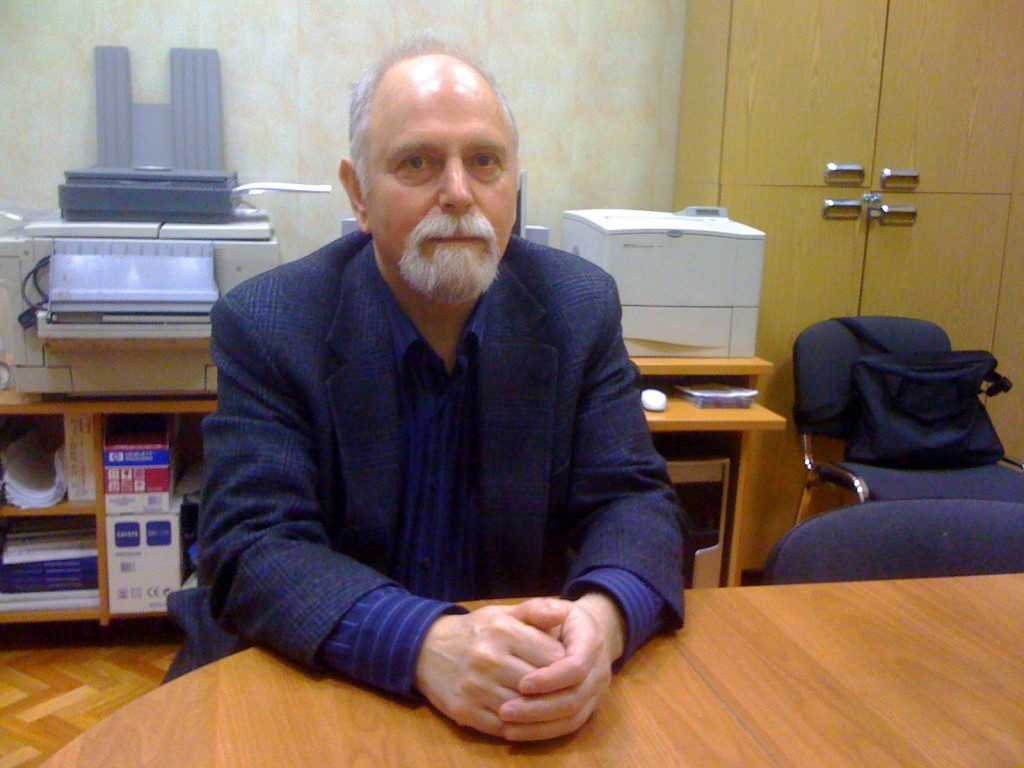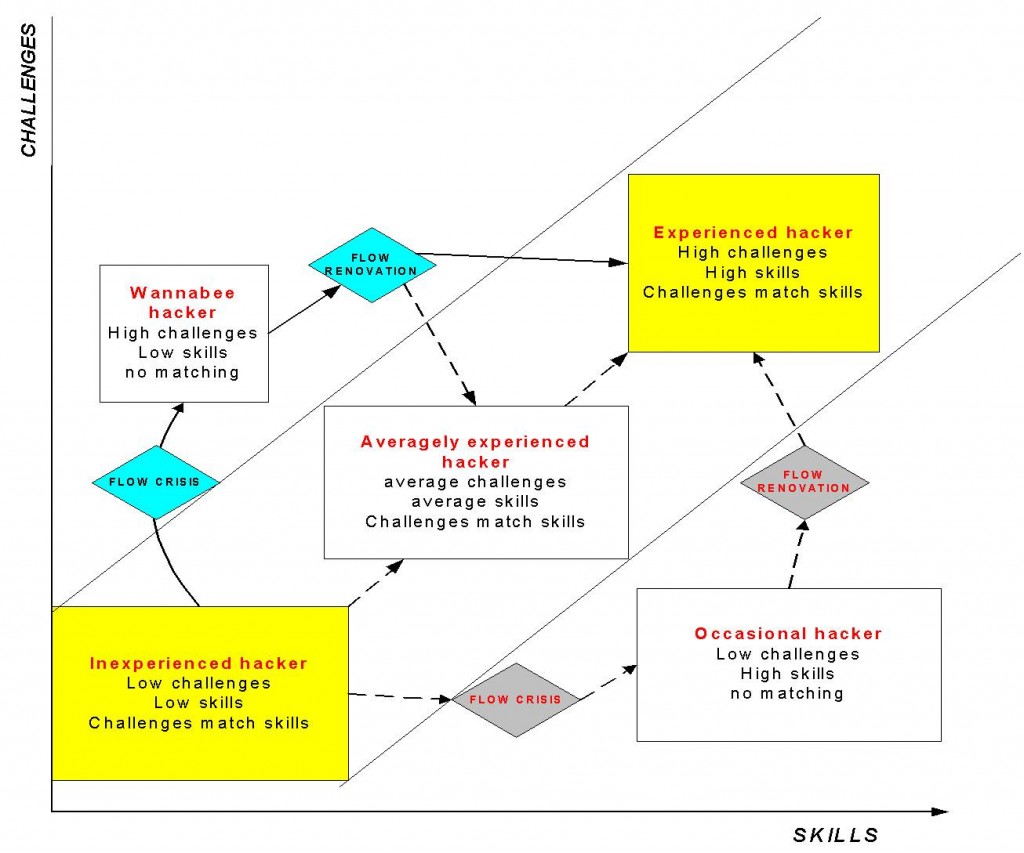
Dr. Alexander Voiskounsky at Psychology Department, MSU
A major part of Russian psychology is based on Vygotsky’s theory. It says that the human mind is developing due to signs systems which human beings acquire and develop. Vygotsky emphasized that human higher mental processes are of social origin, their development based on mediated forms of behavior. Mediation is fundamental since it includes acquiring and using instruments: material tools, signs, and semiotic systems. The information technologies, computers and the Internet belong to the most complicated signs systems and semiotic instruments. Thus, Russian psychology is very likely to include Internet related studies into the body of psychological research.
For how long have you been studying the Internet?
The origin of the studies was in the mid 80s when two groups have been analyzing the Internet. One was headed by Michael Cole who came from the United States and brought equipment and some funding. He concentrated on school children and scientists as two perspective groups that close to development of these technologies. The second group was headed by my teacher professor Tikhomirov. I was the first and, at least for a while, the only researcher and conducted some studies long before the Internet has been available in the Soviet Union. I was lucky to meet some researchers from the Academy of Science of Soviet Union that had access to new-born telecommunications. The word “Internet” was unknown at that time. They did not give me an access – it was forbidden – but they allowed me to study the listings of all communications and I have done some content analysis. After that, in 1991, I got a full access to the Internet.
At the outset, the psychologists were the most prepared team to do the study. Later, other disciplines joined the Internet research field including sociologist, philologists, philosophers and educationalists.
What is the current state of the Internet research in Russia?
Internet studies in Russia have profound background and good history. But nowadays “good” studies are not sufficient at all. I wouldn’t say the research component in new technologists is big enough. There are some sporadic PhD studies or some small books published by small teams of enthusiasts and volunteers in the field. I devote 90 percent of my time to this field of study. And when I go abroad, I am doing my best to pretend that in Russia has a well-developed field of cyber psychology or cyber-related studies.
Why do you think that the Internet in Russia is not researched enough?
Last year I got a letters from a young woman who worked on her PhD thesis at a university somewhere in western Siberia. She wrote that the research council dismissed her study because she used a methodology of online surveying and all the respondents were virtual persons and the council suspected that the woman could have done all 500 responses. She asked me what to do. I have sent her a couple of methodological papers. Well, I was precautious enough that before doing online studies we wrote methodological papers that the new sort of methodology is worth in psychology. However, many of those students who are interested in these studies don't want to have problems with research councils and they choose more stable research topics.
So what are the main topics of your research?
We studied the motivation of computer hackers. I guess it was the first psychological study of hackers in the world. The results were quiet interesting since we used the methodology of positive psychology or flow experience developed by Mihaly Csikszentmihalyi. We have found that the most experienced and the least experienced hackers have been experiencing the flow. The flow means that you are interested in the work you are good at. You work full time and you pay a great attention to your work. But it was different with the middle group of relatively experienced or relatively inexperienced hackers. They do not experience the flow. We have made a model saying that you can not keep being in the flow if you are developing .

Flow-based model of computer hackers’ motivation.
Russian hackers are very infamous. How you can apply this approach to help solve this problem?
I have given my paper to juridical authorities. The goal is not only to punish hackers but to prevent them from down the criminal path. It’s a good root for newbies hackers to be taught how to avoid becoming criminals. In a way, this is an educational challenge for educationalist. You should push the newbies toward the route of acquiring and getting knowledge, not acquiring new hacking challenges. The devote experience show that many former hacker are not hackers now but experts for computer security and they have gone through this route by themselves.
So what actually should be done?
The solution is in moral development of adolescences. Teenagers know quite well the moral rules and moral imperatives. But I have asked many of them what they do when they have no real-life contact with a person, when your partner is a virtual partner. They hesitated: “Why not get money, get free software or free music from someone who will pay for that.” They are not criminals. They will never steal a wallet from my pocket. But they might be criminals when they don’t treat a virtual person as a real one and this is the challenge of the Internet age. When they distantly break the system, they laugh and feel brave. So, there is a need for brief course of moral education to be developed worldwide. It should be a course for how to apply the moral rules in cyberspace.
Do you have any other fields of research?
Mostly, I do what my students like to do and they like gaming. We have conducted a lot of studies on online gaming. We have constructed a factor analytical model of implicit knowledge the gamers have about the psychological consequences of their gaming. There are eight factors, which gamers are aware of. To my surprise, the research paper was called one of the 11 best papers among 1,500 papers on human computer interaction international conference last year in San Diego.
I also organized a symposium of psychiatrists and psychologists who are doing a study on the Internet addiction and published a book related to this issue. Many people are convinced that the Internet addiction will be very soon officially treated as a psychiatric diagnosis. But the book included one or two papers saying that the Internet addiction was not a sort of sickness but it was a stage of development for human beings to have more profound knowledge and even get energy from the Internet to self development. But the majority of researchers wrote that the addicted had to be cured.
What kind of research your and other groups do on blogging and social networking in Russia?
My group hasn’t done studies on blogging or social networking. I know just one or two groups that are doing some studies on blogging. One is at Psychology Department at St. Petersburg University and the other is probably at Journalism Department of the Moscow State University.
Do you see anything special about the role of Internet in Russia?
It was my general idea that the Internet is a way of departing from totalitarian rule that we came from. When there was only one correct opinion and no alternatives, people had very few possibilities to learn about other points of view. The Internet made it possible to learn about diverse ideas. There are billions of new networkers today who came from totalitarian countries. I always say that the Internet is a good school for departing from totalitarian ideas.
So do you believe that RuNet contributes to democratization in Russia?
I think this was true for those who came to the Internet in the 90's and at the beginning of a new century. And then the Internet became a sort of way back. I mean social networks like Odnoklassniki.ru . This is not a way to development. Psychologically it is quite interesting because it is an experiment in new identities. My students have done a lot of interviews with social networkers. All of them experience double, triple or many identities. But I don’ t think this is very interesting in their ideological or political growth because social networks are very well integrated into the existing political structures.
Why do you think so? It is very popular to consider social networks as a platform that can contribute to development of political activism.
About 15 or 20 years ago, at the time of newsgroup in Usenet, we had a lot of political groups among Russian speaking Internet users. It was just after the collapse of the Soviet Union and very hot discussions among those who supported and opposed it were ongoing. Gradually, it disappeared. When there are no major political events, politics is an issue for a very small group of people who are interested in it. When some important process emerges, the number of people who are interested in politics is increasing. Generally, artificial efforts to increase number of politically active people are not helpful not only in Russia but any other region. Moreover, there is very limited ability to increase a number people who are interested in politics. Policies that aim to increase number of people who involved in political discussion are very limited in their ability to achieve results. There is a limit for how many people you can attract with presents, lotteries and other “candies.” If you stop doing it, the people will leave, and you will have again the same small core of people who were interested in politics before. Therefore, social networks are not different from other spaces of life. Most of people are interested in meeting each other and other things, but not politics.
What are the most promising directions for research of the Internet in Russia?
I am mostly interested in cross-cultural research and for this purpose we need good cooperation with researchers from other countries, as well as common methodologies and budgets.
And how do you solve the situation when the importance of Internet research is not recognized enough in Russian academic community. May be establishing an Institute for Internet research could help?
There are some gradual improvements in regard to status of the Internet research in Russia. We are making some steps forward. As for the Research Center for the Internet, on the one hand it could be good if we had a place with budgets for Internet research. On the other hand, I am afraid that this center would acquire an ideological agenda. Therefore, my answer is that probably we don’t need this kind of center. It would be better if these projects will be grassroots projects that developed from bottom to the top rather than being managed by some “pundits” from the top.
Dr.Voiskounsky, thank you for your time and hospitality at the MSU Psychology Department.
For more information about Internet research in Russia read:
Alexander Voiskounsky, Cyberpsychology and Computer-mediated Communication in Russia: Past, Present and Future, Russian Journal of Communication, Winter 2008, first issues http://marquettejournals.org/images/RJC_Vol_1.pdf p.78
List of paper by Alexander Voiskounsky http://www.informatik.uni-trier.de/~ley/db/indices/a-tree/v/Voiskounsky:Alexander_E=.html







